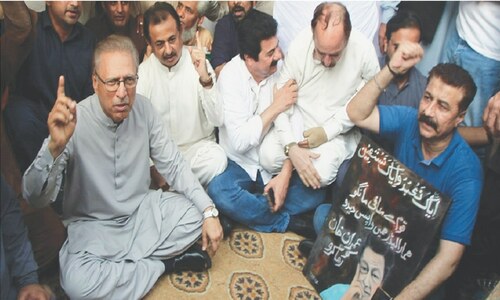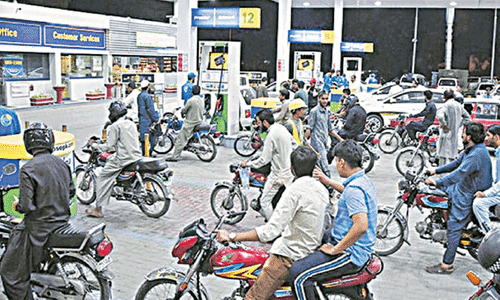ISLAMABAD: The Supreme Court turned down on Wednesday a plea of Bahria Town (Pvt) Ltd Karachi (BTLK) seeking deferment of payment of monthly instalment of Rs2.5 billion for three years in view of pandemic-related economic recession.
A three-judge SC bench headed by Justice Ijaz-ul-Ahsan dismissed the plea with an observation that detailed reasons would be recorded at a later stage.
The bench took up a set of applications moved on behalf of BTLK as well as Attorney General for Pakistan (AGP) Khalid Jawed Khan who had requested the court to allow him and the advocate general for Sindh (AGS) to be represented by nominees of their offices in a high-powered commission constituted by the apex court to oversee disbursement of funds being deposited by Bahria Town.
The court observed that its Oct 26 order had taken care of this aspect but when told that only the AGP and AGS had the voting right in the commission’s meeting, it amended the order saying nominated members would also have voting rights.
Earlier, senior counsel Salman Aslam Butt, representing BTLK, presented a bleak economic situation around the globe as well as of Pakistan, saying the developer was also facing difficulties in furnishing a huge instalment of Rs2.5bn every month.
On March 21, 2019, the Supreme Court had accepted an offer made by BTLK to pay Rs460 billion for 16,896 acres of land the developer had purchased from the Malir Development Authority (MDA).
In its fresh application, the developer requested the court to defer the monthly instalment of Rs2.5bn for a period of three years — from Sept 7, 2020 to September 2023 — in view of the economic recession due to the Covid-19 pandemic.
On Wednesday, Salman Butt argued that there was some “superior force beyond their control” which affected the ability of the developer to make payments. Substantiating his claim, he cited the State Bank of Pakistan’s (SBP) March 26 regulations granting a moratorium of one year to the companies in view of the pandemic which could be extended for another year if the situation did not improve.
The counsel also cited the G-20 Debt Service Suspension Initiative, saying 30 countries had applied for the scheme under which debt repayment had to be suspended for a period from May to December which could be extended to another six months.
He cited Prime Minister Imran Khan’s address to the United Nations General Assembly, stressing the need for economic reforms and calling for suspending and even cancelling the debt in view of the stress since economies of the world cannot sustain.
Salman Butt also quoted the Economic Survey of Pakistan highlighting that due to negative growth in the advanced economies, the IMF provided Pakistan a relief package of $1.38 billion, adding that the country’s industrial growth registered a contraction of -2.64 per cent, whereas its GDP saw a -4pc growth. The most disturbing fact was that forecast for foreign direct investment would drop between 30pc and 40pc.
He said nobody was investing in real estate, adding that 1.3m workers in the UAE and 1.5m in Saudi Arabia were at the risk of losing jobs.
Justice Muneeb Akhtar said the counsel was citing the overall global economic condition of which everybody was aware of, but the court was interested in specific details as to what the pandemic had posed to the developer.
“We are not a bank where you can come to negotiate for resettlement,” Justice Akhtar observed. “We have given a judgement and it is the problem of the developer if they are facing difficulties.”
When counsel pointed out that the inflow of the developer had reduced considerably, compared to its outflow, Justice Ahsan said the court need hardcore data of the difficulties like audited accounts, etc.
“What the court understands is that the entire land of the Karachi project has already been sold by the developer,” Justice Ahsan said, adding that the fact remained that the developer was in possession of an asset which they had developed and used, then why they could not pay. “You have got seven years and the present economic situation will not remain constant in these years,” he said.
Barrister Syed Ali Zafar, also representing BTLK, argued that to pay a monthly instalment of Rs2.5bn, the developer had to earn a net income of Rs100m per day, based on average 25 working days as per month.
Explaining further, he said the developer had to generate Rs1.2bn to pay as compensation to the people who were allotted plots outside the 16,896-acre land, besides another Rs1.2bn to pay salaries, etc. A NAB case was also pending against the developer, he added.
Justice Akhtar reminded the counsel that the payment of monthly instalment of Rs2.5bn should be the obligation number one of the developer.
When the opinion of the AGP was sought on the applications of BTLK, he said that since neither he was under any notice nor had he seen the applications for the grant of moratorium, the issue was between the court and the developer.
About his request for appointing a head of the commission for Karachi, the court said it would issue a directive in this regard after a thorough consideration.
Published in Dawn, December 17th, 2020














































Dear visitor, the comments section is undergoing an overhaul and will return soon.